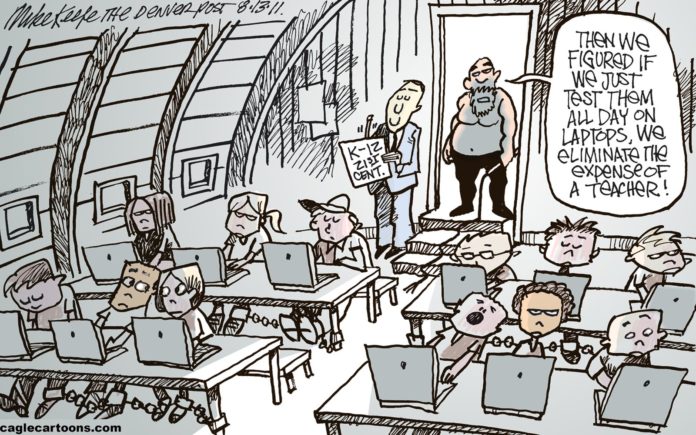BY CLAUDIA SWISHER
Teachers have unwittingly contributed to the recent attacks on our profession by not becoming political, not being active and involved. These attacks and the damages they’ve done to public education are, therefore, self-inflicted wounds. The question is, will we staunch the bleeding or sit helplessly by and allow the damage to continue?
By nature, we teachers are apolitical. Since we work with all children every day we try to balance and respect the views of our students, their parents and our administration. That balancing act demands that we not take sides in the classroom, be open and accepting of all, as we teach our students to analyze ideas, and points of view through close reflection.
We are engulfed by the demands of our jobs – with planning, delivering instruction, revising, teaching, assessing, planning, instructing, revising … Our teaching life is more than a full-time job, and often we’re so weary we hesitate to take on “one more thing.”
After 36 years in the classroom, voting in every election, being the best citizen-teacher I could be, I decided teachers cannot afford to sit quietly on the sidelines, voting, but not speaking up. Or worse, not voting. Or worst, not even registering to vote.
Today, teachers’ very apolitical stance, our acquiescent silence, is being used against us, and more critically, against the students we teach. Policymakers count on most of us staying quiet.
One statistic I’ve heard suggests only 30% of the teachers in Oklahoma even vote. We have ceded our rights and our voice by not voting, or by voting without thoroughly checking out the platforms of candidates.
Some of us, like some voters in general, vote straight party tickets without investigating the messages of candidates who become our elected leaders. Some of us vote for one knee-jerk issue that in no way actually impacts what really happens in our classrooms, issues that are used to manipulate and enflame.
So, if only 30% of teachers vote, we have given up our right to affect educational policy, and to share our expertise.
If only 30% of teachers vote, policymakers assume we’ll sit quietly as they attack our retirement programs, our professional organizations, and our commitment to our own personal and professional growth.
If only 30% of us vote, lawmakers assume we’ll accept laws that mandate more testing, more testing misused to promote students, to evaluate teachers and to grade schools. Lawmakers, many of whom have never taught a day in public schools, now decide they know what and how we should teach, and they assume we will quietly continue working under a heavier and heavier burden of mandates.
It’s an ugly truth, but teachers must accept partial responsibility for the current anti-teacher, anti-education climate in our state, because we have been apolitical. We don’t vote. We vote without studying the issues.
We have elected, or allowed to be elected, lawmakers whose stated plan is to cripple public schools, to send public tax money to private schools, to encourage charters to squeeze public schools, to invite for-profit online schools to cannibalize our schools.
We have allowed policymakers to label us as whiners when we point out the promises that have been broken. We sat still as teacher evaluations are now based on student test scores.
We are complicit. We have chosen not to vote, to not even register to vote. We have chosen to vote without investigating candidates’ motives.
Our current anti-teacher, anti-public education climate is, in part, a self-inflicted wound. Not only is the profession, and indeed, all of public education, bleeding, we stood still as it happened. We helped; we allowed others to damage our profession and the public education system we’ve devoted our lives to. We did not protect ourselves and our students and our profession from attack.
Now, what’s our plan to heal the damage?
Mine is to continue contacting my legislators, to tell my story, to volunteer my expertise. I will educate myself about the legislation coming forward. I’ll confront my legislators about any involvement with ALEC, which writes much of the current legislation being passed around the country. I’ll get involved with candidates’ campaigns, volunteering time and donating money if I can. I will ask questions. I’ll find other professionals who feel as passionately as I do, and I’ll work with them, together, for all students. I will be loud.
Teachers, what’s your plan?
– Claudia Swisher teaches at Norman North High School and is a National Board Certified Teacher. She is a regular contributor to The Oklahoma Observer.








